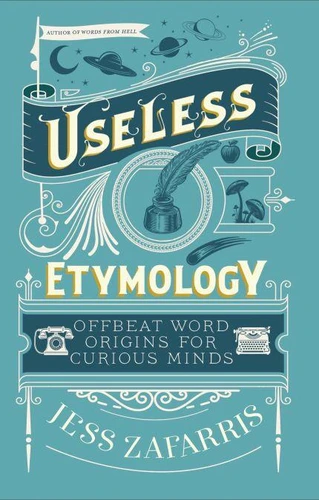Nouveauté
Useless Etymology. Offbeat Word Origins for Curious Minds
Par :Formats :
Disponible dans votre compte client Decitre ou Furet du Nord dès validation de votre commande. Le format ePub protégé est :
- Compatible avec une lecture sur My Vivlio (smartphone, tablette, ordinateur)
- Compatible avec une lecture sur liseuses Vivlio
- Pour les liseuses autres que Vivlio, vous devez utiliser le logiciel Adobe Digital Edition. Non compatible avec la lecture sur les liseuses Kindle, Remarkable et Sony
- Non compatible avec un achat hors France métropolitaine
 , qui est-ce ?
, qui est-ce ?Notre partenaire de plateforme de lecture numérique où vous retrouverez l'ensemble de vos ebooks gratuitement
Pour en savoir plus sur nos ebooks, consultez notre aide en ligne ici
- Nombre de pages336
- FormatePub
- ISBN978-1-3998-0920-7
- EAN9781399809207
- Date de parution09/10/2025
- Protection num.Adobe DRM
- Infos supplémentairesepub
- ÉditeurChambers
Résumé
Did you know that an "astronaut" is literally a "star sailor, " that a thesaurus is, in fact, a "treasure trove" of words, and that someone who is "sinister" is actually just "left-handed"? Have you ever wondered why English isn't considered a Romance language if 60% of our words are Latin-derived? Did Shakespeare really invent 1, 700 words, and if not, why the heck do we say that he did? Why is the English language stuffed with so many synonyms?Let's be real: English can seem pretty bonkers.
And, well, sometimes it is. But through thorough thought and a pinch of curiosity, method can be found within the madness of our modern tongue-even within the disparate pronunciation of the words "through, " "thorough, " and "thought." Derived from Germanic, Romance, Hellenic, Semitic, African and Native American languages, English contains multitudes. It has been (and continues to be) transformed by war and conquest, art and literature, science and technology, love and hate, wit and whim.
Useless Etymology takes readers on a time-traveling adventure to unlock the beauty, wonder, and absurdity within our everyday words, how they came to be, and the unexpected ways their origins weave a global, cross-cultural labyrinth of meaning. Filled with fun facts and delightful discoveries, this is an enlightening read for anyone who wants to know more about why the English language works the way that it does.
And, well, sometimes it is. But through thorough thought and a pinch of curiosity, method can be found within the madness of our modern tongue-even within the disparate pronunciation of the words "through, " "thorough, " and "thought." Derived from Germanic, Romance, Hellenic, Semitic, African and Native American languages, English contains multitudes. It has been (and continues to be) transformed by war and conquest, art and literature, science and technology, love and hate, wit and whim.
Useless Etymology takes readers on a time-traveling adventure to unlock the beauty, wonder, and absurdity within our everyday words, how they came to be, and the unexpected ways their origins weave a global, cross-cultural labyrinth of meaning. Filled with fun facts and delightful discoveries, this is an enlightening read for anyone who wants to know more about why the English language works the way that it does.
Did you know that an "astronaut" is literally a "star sailor, " that a thesaurus is, in fact, a "treasure trove" of words, and that someone who is "sinister" is actually just "left-handed"? Have you ever wondered why English isn't considered a Romance language if 60% of our words are Latin-derived? Did Shakespeare really invent 1, 700 words, and if not, why the heck do we say that he did? Why is the English language stuffed with so many synonyms?Let's be real: English can seem pretty bonkers.
And, well, sometimes it is. But through thorough thought and a pinch of curiosity, method can be found within the madness of our modern tongue-even within the disparate pronunciation of the words "through, " "thorough, " and "thought." Derived from Germanic, Romance, Hellenic, Semitic, African and Native American languages, English contains multitudes. It has been (and continues to be) transformed by war and conquest, art and literature, science and technology, love and hate, wit and whim.
Useless Etymology takes readers on a time-traveling adventure to unlock the beauty, wonder, and absurdity within our everyday words, how they came to be, and the unexpected ways their origins weave a global, cross-cultural labyrinth of meaning. Filled with fun facts and delightful discoveries, this is an enlightening read for anyone who wants to know more about why the English language works the way that it does.
And, well, sometimes it is. But through thorough thought and a pinch of curiosity, method can be found within the madness of our modern tongue-even within the disparate pronunciation of the words "through, " "thorough, " and "thought." Derived from Germanic, Romance, Hellenic, Semitic, African and Native American languages, English contains multitudes. It has been (and continues to be) transformed by war and conquest, art and literature, science and technology, love and hate, wit and whim.
Useless Etymology takes readers on a time-traveling adventure to unlock the beauty, wonder, and absurdity within our everyday words, how they came to be, and the unexpected ways their origins weave a global, cross-cultural labyrinth of meaning. Filled with fun facts and delightful discoveries, this is an enlightening read for anyone who wants to know more about why the English language works the way that it does.




